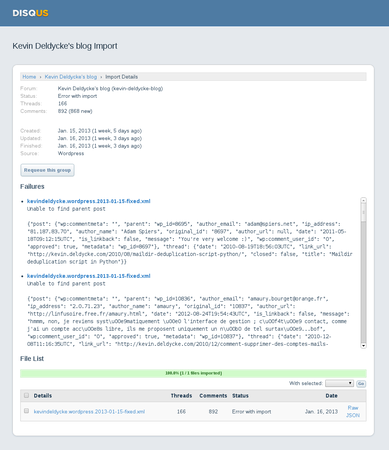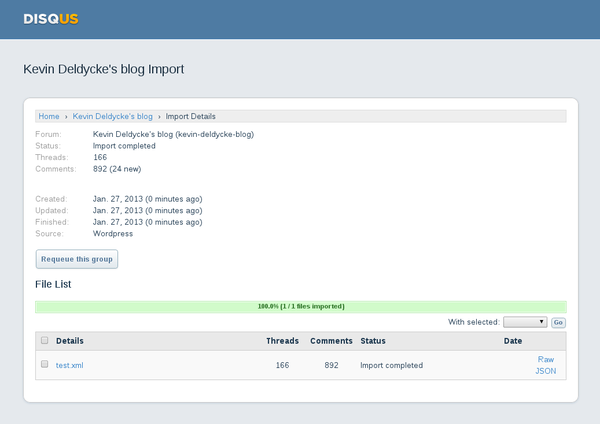I’ve just finished migrating all the comments of this blog from WordPress to Disqus . Why using an external comment platform? It’s just that I plan to ditch WordPress entirely, and switch to a static site generator in the near future. Here are some details on my migration to Disqus.
Disqus has everything you need to easily import WordPress comments. But first, I had to massage some data.
Articles of this blog features a lots of code. Comments are no exception and embed snippets too. Code blocks are rendered by the SyntaxHighlighter Evolved WordPress plugin . This extension use square brackets to enclose code. Disqus uses standard HTML tags .
Let’s update this notation directly in WordPress database:
$ mysqldump --opt kevblog wp_comments > ./comments.sql
$ perl -pe 's/\[code lang=(.*?)\]/<pre><code class=\1>/g' ./comments.sql > comments-fixed.sql
$ sed -i 's/\[\/code\]/<\/code><\/pre>/g' ./comments-fixed.sql
$ mysql kevblog < ./comments-fixed.sql
Disqus doesn’t support HTML
lists
.
So I manually updated WordPress comments to remove occurrences of
<ul>
and
<ol>
, and replace
<li>
by an UTF-8
•
bullet
.
Another issue: if Disqus support images in comment , in imported comments they are left as HTML tags and therefore not rendered by Disqus. I was the only one on my blog posting images in comments. So I simply moved them to the corresponding parent article.
I then had to fix the comment threading. In the first versions of WordPress, sub-commenting was not supported. I addressed this issue by recomposing threading with a series of MySQL queries:
UPDATE `wp_comments` SET `comment_parent` = 234 WHERE `comment_ID` = 342;
UPDATE `wp_comments` SET `comment_parent` = 4987 WHERE `comment_ID` = 5667;
UPDATE `wp_comments` SET `comment_parent` = 10915 WHERE `comment_ID` = 10916;
(...)
After all these updates, my comments where ready to be exported to Disqus .
If most of my comments were successfully imported, some were left-out. The importer was not able to find their parents:

But the reported error was not true: parent’s IDs were good and referenced an existing comment. Besides, comments Disqus was not able to import were correctly placed in their thread on my original WordPress blog.
For a moment I trough Disqus import code was
subject to a race
condition
.
But there was no
<wp:comment_parent
/>
tags in my XML file.
I also checked that no comment were moderated:
$ grep -c "<wp:comment_approved>0</wp:comment_approved>" ./kevindeldycke.wordpress.2013-01-15-fixed.xml
0
$ grep -c "<wp:comment_approved>1</wp:comment_approved>" ./kevindeldycke.wordpress.2013-01-15-fixed.xml
892
I decided to check the comments carefully. Following the chain of comment’s parents, I found the root cause. All unimported comments were descendants of an anonymous commenter. These shared the following empty properties:
<wp:comment_author><![CDATA[]]></wp:comment_author>
<wp:comment_author_email></wp:comment_author_email>
I then decided to forced anonymous comments to bear a generic author’s name:
$ perl -0p -e 's/(<wp:comment_author><!\[CDATA\[)(\]\]><\/wp:comment_author>\s*<wp:comment_author_email><\/wp:comment_author_email>)/\1Anonymous\2/sg' ./kevindeldycke.wordpress.2013-01-15-fixed.xml > test.xml
Resulting in the following changes:
--- ./kevindeldycke.wordpress.2013-01-15-disqus-import-fixed.xml 2013-01-15 11:24:06.929837283 +0100
+++ ./test.xml 2013-01-27 16:19:00.062626017 +0100
@@ -6595,7 +6595,7 @@
</wp:postmeta>
<wp:comment>
<wp:comment_id>1883</wp:comment_id>
- <wp:comment_author><![CDATA[]]></wp:comment_author>
+ <wp:comment_author><![CDATA[Anonymous]]></wp:comment_author>
<wp:comment_author_email></wp:comment_author_email>
<wp:comment_author_url></wp:comment_author_url>
<wp:comment_author_IP>123.45.67.89</wp:comment_author_IP>
@@ -8376,7 +8376,7 @@
</wp:comment>
<wp:comment>
<wp:comment_id>2382</wp:comment_id>
- <wp:comment_author><![CDATA[]]></wp:comment_author>
+ <wp:comment_author><![CDATA[Anonymous]]></wp:comment_author>
<wp:comment_author_email></wp:comment_author_email>
<wp:comment_author_url></wp:comment_author_url>
<wp:comment_author_IP>123.45.67.89</wp:comment_author_IP>
(...)
I then sent the fixed WordPress XML export to Disqus as-is, which imported my 24 missing comments:

